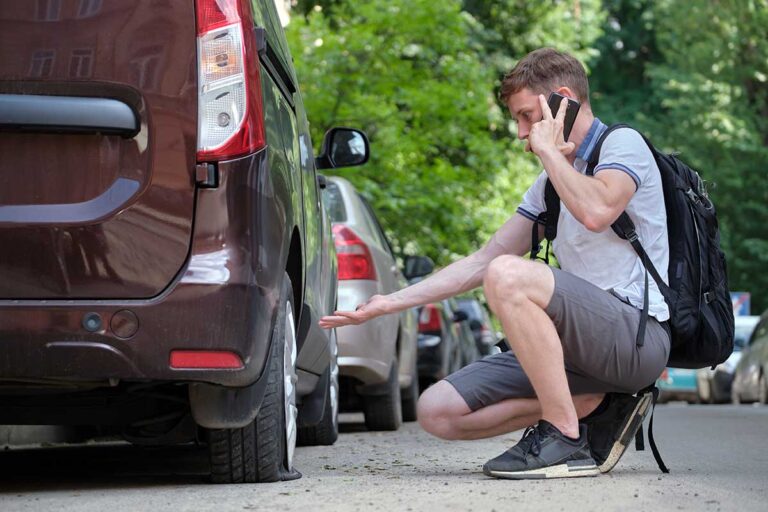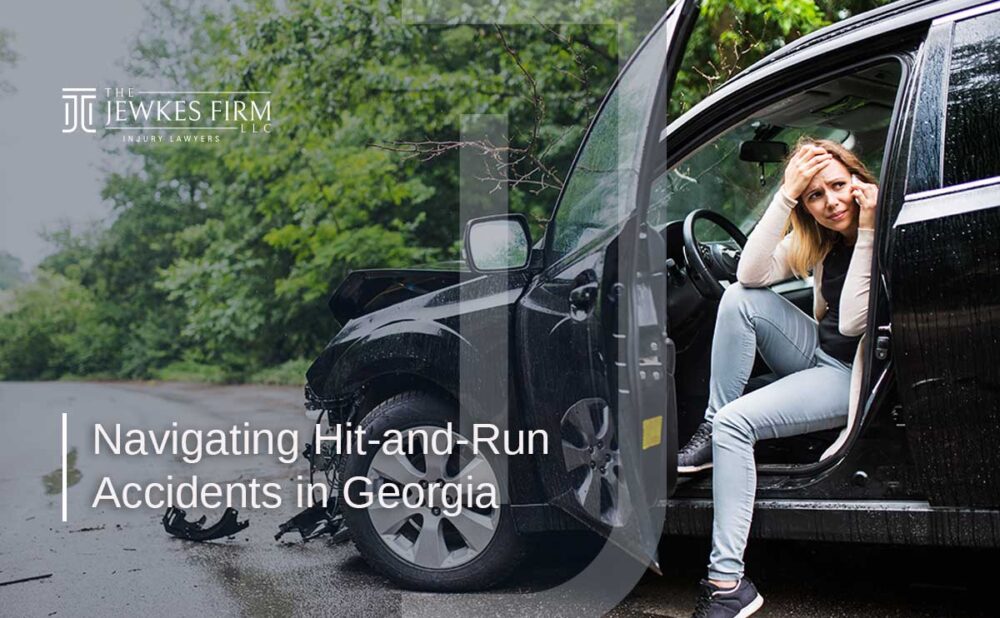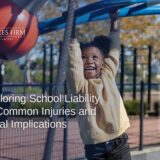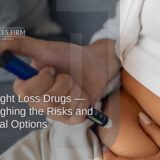Navigating Hit-and-Run Accidents in Georgia
Hit-and-run incidents rank among the most traumatic events for motorists, pedestrians, and cyclists. In Atlanta, characterized by heavy traffic, urban expansion, and bustling intersections, these occurrences have become more frequent. In the blink of an eye, a seemingly routine drive can turn into a chaotic situation, leaving victims grappling with not only physical injuries but also emotional turmoil and financial burdens. In Georgia, the complexities surrounding hit-and-run incidents can further complicate the recovery process for those affected.
At The Jewkes Firm, we understand the unique challenges that arise from hit-and-run situations. This guide delves into the specifics of hit-and-run accidents, outlines practical steps for victims to take, and presents statistics pertinent to Georgia to illustrate the broader implications.
Understanding Georgia’s Hit‑and‑Run Laws
A hit-and-run accident occurs when a driver involved in a collision leaves the scene without providing their contact information or assisting the injured parties. These events can involve vehicles, pedestrians, cyclists, or property damage. In Georgia, this is not only unethical but also illegal. Drivers must stop and exchange information after an accident, regardless of fault. This reckless act not only exacerbates the situation for the victim but also raises complex legal issues. In Georgia, as in many other states, leaving the scene of an accident is a serious offense that can lead to criminal charges and civil liability.
Georgia Hit-and-Run Statistics — An Escalating Issue
Hit-and-run accidents are not merely random occurrences; they represent a significant challenge across the state. Over the last ten years, Georgia has experienced a concerning increase in these incidents. The Georgia Department of Transportation (GDOT) and the Governor’s Office of Highway Safety have provided critical data highlighting this trend:
Statewide Overview
- In 2023, Georgia recorded more than 39,000 hit-and-run accidents.
- These incidents resulted in nearly 2,500 injuries and 96 deaths.
- Fulton County, which includes Atlanta, frequently ranks among the highest for hit-and-run occurrences.
Insights Specific to Atlanta
- The Metro Atlanta area contributes to over 30% of the state’s annual hit-and-run reports.
- In 2022, there were over 4,300 documented cases of hit-and-run in Atlanta.
- Between 2021 and 2023, fatalities involving pedestrians as a result of hit-and-runs increased by 15%, primarily due to nighttime collisions and insufficient street lighting.
These statistics underscore a significant danger faced by drivers in Georgia, particularly in heavily populated areas such as Atlanta, College Park, Union City, and their neighboring regions.
Victim of a Hit-and-Run? Contact Us For A Free Consultation
Victim of a Hit-and-Run?

Legal Implications in Georgia
Under O.C.G.A. § 40‑6‑270, Georgia treats hit‑and‑run (leaving the scene) as a criminal offense:
- If a collision causes death or serious injury, leaving the scene is a felony, punishable by 1 to 5 years in prison.
- If it causes non-serious injury or only property damage, it’s a misdemeanor, with a fine of $300–$1,000 and/or up to 12 months in jail, escalating for repeat offenses within five years.
What the Law Requires You to Do at the Scene
Georgia drivers must:
- Stop immediately at or near the crash site.
- Give your name, address, vehicle registration, and—if requested—your driver’s license.
- Render aid to injured parties, such as arranging medical help or transporting them.
- If someone is unconscious or deceased, call EMS and law enforcement immediately.
- Stay until you’ve fulfilled these duties.
Failure to stop can result in a misdemeanor charge under O.C.G.A. § 40‑6‑273, which carries a maximum fine of $1,000, possible jail time, and three license points.
Victims of hit-and-run accidents may also face challenges in seeking compensation. Georgia is a fault state, meaning that the driver at fault is liable for damages. However, if the person responsible can’t be found, victims may need to rely on their own insurance policies or other avenues for compensation. Knowing these legal implications is crucial for navigating the aftermath of a hit-and-run accident effectively.
Understanding the nature of hit-and-run accidents and the legal framework in Georgia can empower victims to make informed decisions about their next steps. In the following sections, we will discuss the practical steps to take after such an incident, including how to gather evidence, report the accident, and pursue compensation for damages.
Common Causes of Hit-and-Run Accidents
Hit-and-run accidents happen for numerous reasons including:
- Fear of Legal Consequences. Uninsured, unlicensed, or intoxicated drivers may flee the scene to avoid penalties.
- Panic or Confusion. In the heat of the moment, a driver may panic and drive away without thinking about the consequences. This is common if they believe they are at fault, prompting them to leave rather than confront the situation.
- Lack of Responsibility. A subset of drivers may simply lack a sense of responsibility or moral obligation, choosing to evade accountability for their actions.
- Involvement in Other Criminal Activities. If a driver has committed other crimes—such as robbery or possession of illegal substances—they may flee the scene to avoid additional charges.
Understanding these causes can shed light on the motivations behind hit-and-run incidents and the importance of addressing the aftermath responsibly.

Steps to Take After a Hit-and-Run Accident in Georgia
Experiencing a hit-and-run accident can be a disorienting and stressful event. However, knowing the appropriate steps to take immediately after can significantly impact your recovery and any potential legal proceedings. Here’s a guide to help you navigate hit-and-run situations.
- Ensure Safety. The first priority after any accident is to ensure your safety and the safety of others involved. If you are able to move your vehicle safely to the side of the road, do so to avoid further collisions. Turn on hazard lights to alert other drivers. Remain at the scene and wait for law enforcement.
- Check for Injuries. Assess yourself and any passengers for injuries. Call 911 immediately for medical emergencies. Do not attempt to move injured parties unless there is an immediate danger.
- Seek Medical Attention. Even if you feel fine, let a medical professional check you out. Injuries may not be immediately apparent.
- Stay Calm. It’s natural to feel a rush of emotions after a hit-and-run, but try to remain calm. Panic can cloud your judgment and hinder your ability to gather important information.
Gathering Evidence and Witness Information
- Document the Scene. If you are physically able, take photos of any visible injuries as well as the accident scene, including damage to your vehicle, road conditions, traffic signs, and any relevant environmental factors. This documentation can be crucial later on.
- Gather Witness Information. If there are any witnesses, ask for their contact information. These statements may be crucial in identifying the hit-and-run driver.
- Write Down Details. As soon as possible, write down everything you remember about the accident. This includes the time of day, weather conditions, and any details about the fleeing vehicle (make, model, color, and license plate number, if possible).
Reporting the Incident to Authorities
- File a Police Report. Contact the local police to report the hit-and-run to law enforcement as soon as possible. Provide them with as much information as possible, including photos, a description of the fleeing vehicle and its license plate number. A police report serves as an official record of the incident. This may be necessary for insurance claims and legal proceedings.
- Obtain a Copy of the Report. After the police have completed their investigation, be sure to request a copy of the accident report. This document will outline the details of the incident and can be beneficial when dealing with insurance companies or pursuing legal action.
- Notify Your Insurance Company. Report the hit-and-run to your insurance provider as soon as possible. Generally, your policy terms require this prompt notification, which can help facilitate your claim. Be honest about the details, but avoid admitting fault or providing unnecessary information.
By following these steps, you can ensure that you handle the aftermath of a hit-and-run accident effectively. Remember, staying calm and methodical in your approach will help you navigate this difficult situation more smoothly. Prompt action can preserve evidence and greatly aid both criminal and civil outcomes.
If you were hit by a fleeing driver, you can:
- File a claim against the driver’s liability insurance, if identified.
- Use your uninsured/underinsured motorist coverage for medical/property claims.
- Consider applying to the Georgia Crime Victims Compensation Program for assistance with medical, funeral, counseling, or income loss.
- File a personal injury lawsuit within statutory deadlines—typically 2 years for bodily injury, 4 years for property damage.
Navigating the legal landscape after a hit-and-run accident can be complex. An experienced hit-and-run accident attorney can assist you in gathering evidence, negotiating with insurance companies, and representing you in court if necessary.
Need a Free Consultation? Need a Skilled Attorney?
Free Consultation
Call (770) 771-5130
If you’ve been injured, you need to hire the best legal care to assist you with your claim. Get a FREE consultation today!
Legal Options for Hit-and-Run Victims in Georgia
Experiencing a hit-and-run accident can leave you not only physically injured but also financially burdened. In Georgia, victims of hit-and-run accidents have several legal avenues to pursue compensation for their injuries and damages. Here, we break down the steps you can take to navigate the complex landscape of insurance claims and legal options in Georgia.
Understanding Insurance Coverage
In Georgia, most drivers must carry liability insurance. This insurance helps pay for damages if an accident happens. However, a hit-and-run complicates the situation. If the at-fault driver is not identifiable, you may need to rely on your own insurance policy for compensation. It’s essential to be aware of the types of coverage that may apply:
- Uninsured Motorist Coverage (UM). This type of coverage protects you if you have an accident with an unidentified driver or a driver who does not have insurance, as in the case of a hit-and-run. Georgia law requires insurers to offer UM coverage, but you must opt-in to include it in your policy.
- Collision Coverage. This coverage helps pay for damage to your vehicle after an accident, regardless of who is at fault. If you have collision coverage, your insurance may cover the repairs or replacement of your vehicle after a hit-and-run.
- Medical Payments Coverage (MedPay). This optional coverage can help pay for medical expenses resulting from an accident, regardless of who was at fault. It can be particularly beneficial in a hit-and-run scenario, where seeking compensation for medical bills is critical.
Filing a Claim with Your Insurance
Once you understand your insurance coverage, the next step is to file a claim with your insurance company. Here are the steps to follow:
- Contact Your Insurer. Notify your insurance company as soon as possible. Provide them with details of the incident, including the time, location, and any information you have about the hit-and-run driver.
- Provide Documentation. Insurers typically require documentation to process your claim. This may include a police report, photographs of the accident scene, medical records, and repair estimates for your vehicle.
- Cooperate with the Investigation. Your insurance company may conduct its own investigation into the accident. Be prepared to answer questions and provide any additional information they might need.
Legal Options for Seeking Compensation
If your insurance coverage is insufficient to cover your damages or if you encounter difficulties with your claim, you may need to consider legal action. Here are some options to explore:
- Consult with a Personal Injury Attorney. Given the complexities of hit-and-run cases, consulting with an experienced hit-and-run accident attorney can provide you with valuable insights. The Jewkes Firm can help you understand your legal rights, evaluate your case, and guide you through the process.
- File a Lawsuit. If your damages exceed the limits of your insurance coverage or if the insurance company unfairly denies your claim, you may have the option to file a lawsuit against the unknown driver. This can be a challenging process, as it may require locating the driver or proving liability in court.
- Seek Additional Compensation. If you sustain significant injuries or damages, you may pursue compensation for medical expenses, lost wages, pain and suffering, and other losses. An attorney can help you calculate the full extent of your damages and advocate for your best interests.
In summary, pursuing compensation after a hit-and-run accident in Georgia involves understanding your insurance coverage, effectively filing a claim, and exploring legal options if necessary. With the right resources and support, you can navigate this challenging situation and work towards achieving the compensation you deserve.

GEORGIA PERSONAL INJURY LAWYER NEAR ME
Why You Need an Expert for a Hit-and-Run Accident in Georgia
Georgia hit‑and‑run statutes are complex, with serious criminal and licensing consequences. The Jewkes Firm can help:
- Protect your rights and driving privileges, seeking reductions where possible.
- Negotiate with insurance firms to maximize your compensation.
- Navigate restitution and criminal negotiations, including DMV hearings for restricted licenses.
- If you’re a victim, pursue full recovery via insurance, victim’s compensation, and personal injury claims.
Being involved in a hit-and-run accident in Georgia can be a distressing experience, but you don’t have to face it alone. Georgia has stringent laws regarding hit-and-run accidents, and there are legal avenues available to help you pursue justice and compensation for your damages. By taking immediate action at the scene, gathering critical evidence, and promptly reporting the incident, you can bolster your case and improve your chances of receiving fair compensation.
If you or a loved one has been injured in a hit-and-run accident, contact Attorney Jordan Jewkes today at (770) 771-5130 for a free consultation.
Frequently Asked Questions
What is a hit-and-run in Georgia?
A hit-and-run in Georgia occurs when a driver involved in an accident leaves the scene without providing information or assisting injured parties as required by law.
Is leaving the scene of an accident a felony in Georgia?
Yes—if the accident causes serious injury or death, leaving the scene is a felony punishable by 1 to 5 years in prison.
What are the penalties for a misdemeanor hit-and-run in Georgia?
Penalties include fines ranging from $300 to $1,000, up to 12 months in jail, and a driver’s license suspension of one year or more depending on prior offenses.
Can I get compensation if the at-fault driver fled the scene?
Yes. You may be able to recover damages through your uninsured motorist coverage or apply for state crime victim compensation.
What damages can I claim after a hit-and-run?
You can claim medical expenses, property damage, lost wages, and pain and suffering resulting from the accident.





